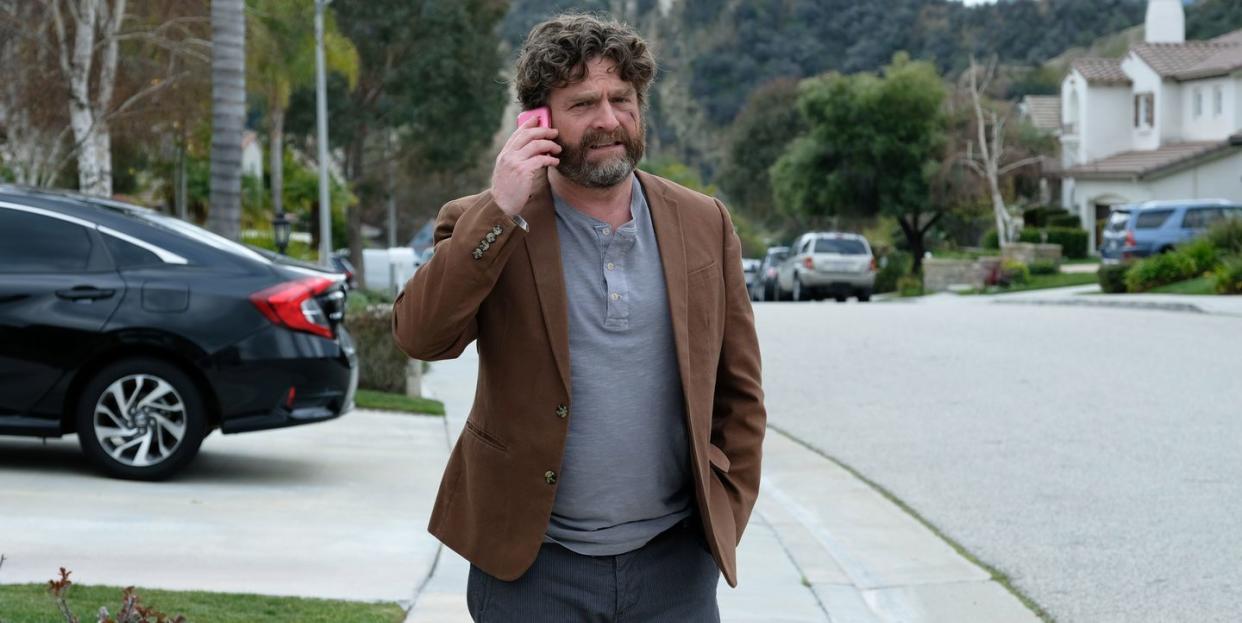Zach Galifianakis' 'Baskets' Is Still One of the Funniest Shows on TV

By the end of the third season of Baskets, it seemed like Zach Galifianakis and his creative team were ready for a change of pace. The fantastic FX series, which was buffoonish and delightfully inane when it first kicked off in 2016, had started to peel itself back. Over the course of the first few seasons, the show’s focus gradually begun shifting away from its initial Three Stoogey tone, becoming more introspective and less slapstick. The series had started to grow, and it began to conceive of its central characters as full human beings, instead of anthropomorphized punchlines of Galifianakis’s stand-up routine. But by doing so, the singular voice of Baskets hung in the balance.
The uproarious physical comedy focus of Baskets is what made the show so unique in our crowded media landscape, and as the series attempted to drift into subtle, more intimate territory, it seemed as though Chip, Dale, and Christine Baskets may not be long for this world. But after watching the first four episodes of Season Four of Baskets, I can tell you, the series has changed for the better. By finally treating these stilted, tortured characters like human beings instead of comic relief, the show has stripped the makeup off its Sad Clown routine, and feels more alive than ever.
When we first meet Chip Baskets in Season Four, his clown persona seems like just a faint red nose in a strikingly complex portrait of a full-fledged person. Where the show initially structured its punchlines around the idiotic tragedy of Chip's failed artistic career, Baskets is now more interested in portraying the sensitive drifter for who he really is: the victim of childhood trauma. Chip has always carried the burden of his father's suicide and his mother's eating disorder, but in the first four episodes of Season Four, the series gets serious about Chip's deep pain as a human being.

While Galifianakis has already given us some moving flashbacks that divulge the inner life of this character, Season Four brings Chip face-to-face with a self-help guru, who takes a special interest in unpacking the many deep-set obstacles that have hampered this guy's arrested growth. For those of us with experience in therapy, the depiction of mental health treatment in Baskets, though shown through the lens of a quirky self-help group, feels surprisingly truthful. Chip's forced to answer some questions about his life, his desires, and his struggles, and instead of framing the character's mental health state as a punchline, Baskets finally allows Chip to reckon with the source of his trauma and do the real work. In the first four episodes, we don't see Chip in his clown get-up at all, and without the white makeup to hide behind, the sadsack's inner-life is on full display, and the series becomes all the more vulnerable because of it.

Galifianakis has made a career of lampooning the sort of overgrown manchildren and self-righteous dumbasses that populate Baskets' world of Bakersfield, California. Chip's brother, Dale, is an absurd gun nut and misogynistic idiot. Their mother, Christine, is obsessed with material trinkets and acts oblivious to almost all social cues. And Chip's best non-friend, Martha, is a comic punching bag, a lost cause who can barely make her voice audible much less fend for herself amongst all these raging, selfish morons. The show has spent its time unraveling the bonkers personalities of each of these central characters, exploiting their obvious flaws for insatiable comic effect. But Season Four takes a more holistic approach. The rodeo is closed for the season, and Chip's days as a clown are long gone–for now. Dale is no longer a happy member of the family, exiled to a trailer park away from his children and ex-wife. Ken and Christine are moving in, and so the Baskets family is saying goodbye to their childhood home, too. This is the home where Chip and Dale grew up together, where the family had once been a unit and Christine's life was whole.
But their home is also the place where the two boys were traumatized by their father's suicide. It's the place where their young lives were flung into chaos and confusion. Baskets has never really taken an extended look at that trauma before. In fact, their dad's suicide (he "jumped off a bridge") seemed framed as a dark joke in seasons past, very much in line with the pitch-black comic tone that looms over the periphery of this show. But in Season Four, we're seeing each character say farewell to the wounds of their past in their own way.
That's not to say every moment in the show is a serious one, though. While Baskets Season Four is less overtly funny than its three other seasons, the series still delivers on its trademark one-liners and physical gags, best among them a sequence wherein Chip is rollerblading in a robe through a 24-hour drug store. Galifianakis, his writers, and series producer/director Jonathan Krisel are wizards at finding the perfect place for an unexpected zinger, and Season Four has no shortage of varsity-level comic moments. Even with the more emotionally raw tone, Baskets is still by far one of the funniest television shows in the game right now.
('You Might Also Like',)


